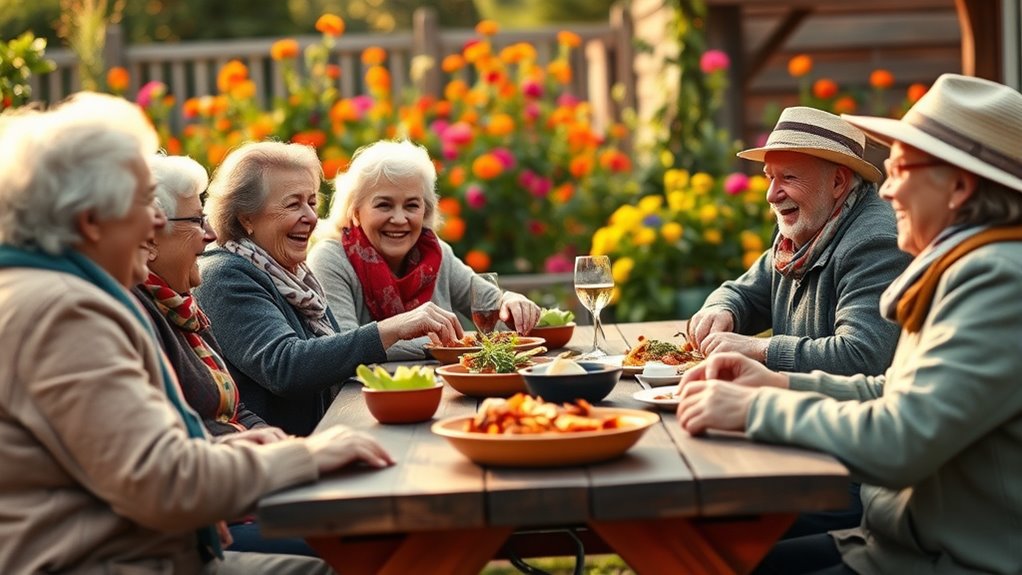Building strong social connections is essential for your overall wellness as you age. Engaging with community activities, maintaining friendships, and sharing experiences help boost your emotional, mental, and physical health. These connections provide support, reduce loneliness, and keep your mind sharp. When you stay socially active, you promote resilience and longevity. To discover how nurturing relationships can transform your senior years, continue exploring the many ways to enhance your well-being through social engagement.
Key Takeaways
- Social connections enhance emotional well-being and reduce feelings of loneliness among seniors.
- Engaging with community activities promotes mental stimulation and helps delay cognitive decline.
- Support networks provide emotional and practical assistance during challenging times.
- Social interactions boost immune function and overall physical health in older adults.
- Maintaining strong social ties contributes to increased longevity and a higher quality of life.

Have you ever wondered how strong social connections can impact your health as you age? The truth is, staying connected with others isn’t just about friendships or hobbies—it’s an essential part of maintaining your overall wellness. When you engage in community activities, you’re not only occupying your time but also building a network that offers emotional support and a sense of belonging. These interactions can notably influence your mental, emotional, and even physical health, making social connection a cornerstone of aging well.
Community engagement provides more than just social interaction; it creates opportunities for you to contribute, learn, and stay active. Whether it’s volunteering at a local center, joining a book club, or participating in neighborhood events, these activities foster feelings of purpose. When you’re involved in your community, you’re more likely to develop a support system that can offer help during challenging times, which is essential as you navigate the changes that come with aging. This sense of belonging can combat feelings of loneliness or isolation, common issues among seniors, and enhance your overall outlook on life.
Emotional support is another key aspect of social connection that directly impacts your health. When you build close relationships, you create a safety net for sharing your thoughts, fears, and successes. Knowing someone understands and cares about your feelings can reduce stress, boost your mood, and even improve your immune function. During difficult moments, emotional support from friends or family can motivate you to seek help and stay resilient, helping you manage chronic conditions or emotional struggles more effectively. Having people to turn to means you’re less likely to feel overwhelmed and more likely to maintain a positive mindset.
Furthermore, social engagement encourages mental stimulation, which is essential for cognitive health. Conversations, group activities, and shared experiences challenge your brain, helping to keep it sharp and potentially delaying cognitive decline. When you actively participate in your community, you’re not only nurturing your emotional well-being but also fostering mental resilience. Incorporating social interaction into your routine can positively influence your brain health and overall longevity. This holistic approach to social connection—combining community engagement and emotional support—can dramatically improve your quality of life as you age.
Frequently Asked Questions
How Can Seniors Overcome Social Anxiety to Build Connections?
To overcome loneliness and build friendships, start small by joining activities you enjoy. Practice deep breathing to ease social anxiety and remind yourself that everyone feels nervous sometimes. Seek support from loved ones or community groups, and set realistic goals for social interactions. Remember, building connections takes time, so be patient and kind to yourself as you gradually become more comfortable engaging with others.
What Are Effective Ways to Maintain Social Ties During Health Setbacks?
When facing health setbacks, you can maintain social ties by staying involved in your community through virtual events or local groups. Reach out to friends and family regularly, sharing your feelings and updates. Focus on building emotional resilience by practicing self-care and mindfulness. These efforts help keep you connected, supported, and engaged, ensuring your social bonds remain strong despite health challenges.
How Does Technology Enhance Social Engagement for Seniors?
Technology helps you stay connected by offering virtual communities and opportunities to build online friendships. You can join groups that match your interests, participate in video calls with loved ones, and share experiences regardless of location. These tools make social engagement easier, especially during health setbacks, keeping you mentally active and emotionally supported. Embracing technology empowers you to maintain meaningful relationships and enjoy a vibrant social life.
Are There Specific Activities That Promote Social Bonding Among Seniors?
You can strengthen social bonds among seniors through group activities and shared hobbies. Participating in community art classes, book clubs, or gardening groups encourages interaction and teamwork. These activities create opportunities for seniors to connect over common interests, fostering friendships and reducing loneliness. By engaging in such social activities, you help seniors build meaningful relationships, which are essential for their overall well-being and happiness.
How Can Caregivers Encourage Seniors to Participate in Social Activities?
You can encourage seniors to participate in social activities by highlighting the benefits of community involvement and volunteer opportunities. Suggest they join local clubs, attend events, or volunteer, which fosters a sense of purpose and connection. Make it easy by offering transportation or companionship. Show enthusiasm and support, helping them see how these activities boost their well-being and create meaningful relationships. Your encouragement makes a big difference in their engagement.
Conclusion
So, after all this talk about the importance of social connections, it’s almost amusing how we often overlook the simplest remedy for senior wellness. In a world obsessed with pills and procedures, sometimes the best medicine is a genuine conversation or a shared laugh. Irony isn’t lost here: in neglecting our social ties, we risk losing the very essence of vitality. Maybe the real secret to aging well is just staying connected—who knew?








